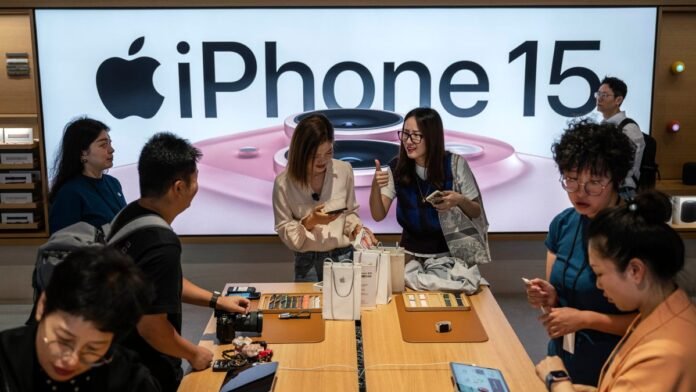Apple earlier this month unveiled its generative artificial intelligence plans, which are rolling out later this year — but it’s facing a problem in its second-largest iPhone market.
OpenAI’s ChatGPT, which Apple is integrating into its newest iPhone, iPad, and Mac operating systems, is not available in China along with other AI models developed outside the country. Apple also announced it’s building its own AI features called Apple Intelligence for its native apps. Therefore, the company is looking for a local AI developer to help it roll out its AI features in China as it competes with homegrown smartphone makers, the Wall Street Journal reported, citing unnamed people familiar with the matter.
Apple’s iPhone sales in China have fallen behind those of its Chinese competitors, plummeting 19% in the first quarter of this year — it’s worst performance in the country since the beginning of the COVID-19 pandemic in 2020. It has even had to slash iPhone prices amid slowing sales.
The iPhone maker’s share of China’s smartphone market fell in the first quarter to 15.7% from 19.7% the previous year, according to Counterpoint Research. Apple fell to third place behind Chinese sellers Vivo and Honor, and just above Chinese tech company Huawei, which saw smartphone sales rise almost 70% after releasing its Mate 60 Pro series which uses an advanced Kirin 9000s chip. However, U.S. Secretary of Commerce Gina Raimondo said the chip “is not nearly as good” and “years behind” advanced chips produced in the U.S.
Despite falling sales, Luca Maestri, Apple’s chief financial officer, told the Wall Street Journal in May: “China is the most competitive market in the world, and we feel confident about our position.” Apple did not immediately respond to a request for comment.
Apple has reportedly discussed deals with Chinese AI developers, including Baidu — which built China’s version of ChatGPT called Ernie Bot — Alibaba, and Beijing-based startup Baichuan AI. The Cyberspace Administration of China requires AI models undergo a “security assessment” before being released to the public, and content generated by chatbots should “reflect the core values of socialism, and must not contain subversion of state power.” As of March, the CAC has approved 117 generative AI models, but none were developed outside of China, the Wall Street Journal reported.









